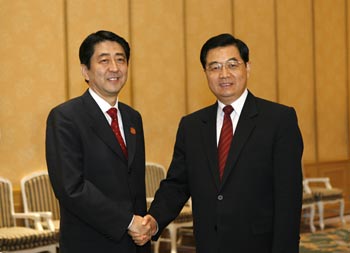
Chinese
President Hu Jintao (R) shakes hands with Japanese Prime Minister Shinzo Abe in
Hanoi, Nov. 18, 2006. -Xinhua
Chinese President Hu Jintao and Japanese Prime Minister Shinzo Abe
met in Hanoi on Saturday with both leaders expressing the willingness
to maintain the good momentum of the development of relations between the two
countries.
"The Sino-Japanese ties are now at a crucial juncture," Hu said when he met
Abe before the beginning of the 14th Economic Leaders' Meeting of the
Asia-Pacific Economic Cooperation (APEC) forum slated for Saturday and Sunday.
The talks, the second between the two leaders since early October,
demonstrated their common aspiration to improve relations between China and
Japan and marked a new era in the Sino-Japanese relations, Hu said.
At their Beijing meeting last month, both leaders agreed that they should
view the Sino-Japanese ties from the long-term and strategic perspective so as
to achieve the great objective of peaceful coexistence, friendship for
generations, cooperation of mutual benefit and common development, the Chinese
president said.
"The two sides also reached wide-ranging consensus on enhancing political
trust, boosting cooperation of mutual benefit, expanding exchanges of personnel
and promoting cooperation in international and regional affairs," Hu said.
To further promote bilateral cooperation, President Hu put forward a
five-point proposal -- charting the direction of the development of bilateral
ties, deepening friendship between the two peoples, promoting mutually
beneficial cooperation, making joint efforts to promote peace, stability and
development in Asia, and properly handling the sensitive issues related to
Taiwan and the history of Japanese invasion.
The sensitive issues are closely related to the political foundation of
bilateral relations between the two countries, Hu said.
The two countries should also speed up consultation on the East China Sea
issue in line with the principle of mutual benefit and reciprocity, and make it
the "sea of peace, cooperation and friendship," Hu said.
Abe said Japan and China have agreed to build a strategically reciprocal
relationship during his October visit to China, and he hoped to maintain
high-level exchanges so as to push the Japan-China relations to a new high.
The Japanese prime minister suggested the two sides hold a ministerial
meeting at the earliest to coordinate their cooperation in economy and trade, to
strengthen cooperation in energy saving and environmental protection, as well as
to promote exchanges of personnel and boost cooperation in tourism.
He also recommended both sides launch a joint study on the historical issues,
intensify consultation on the East China Sea issue, and boost cooperation among
Japan, China and South Korea in investment, environmental protection and
tourism.
As to the Taiwan issue, Abe said Japan will handle it in accordance with the
principles set in the joint declaration of Japan and China and there has been no
change to the stance.
On the nuclear issue on the Korean Peninsula, President Hu said China and
Japan should continue to strive for peaceful settlement of the issue and achieve
the denuclearization on the peninsula through dialogue as to maintain peace and
stabilization of the situations on the peninsula and Northeast Asia.
The parties concerned should exercise restraint to prevent deterioration of
the situation and the issue could not be simply resolved by sanctions, he said.
Hu expressed China's willingness to make joint efforts with the other parties
to resume as soon as possible the six-party talks, which involve China, the
Democratic People's Republic of Korea, the United States, Russia, South Korea
and Japan.
While backing the denuclearization of the Korean peninsula, Abe said Japan
hailed the agreement to resume the stalled six-party talks.
President Hu Jintao is in Hanoi for a state visit to Vietnam, where he and
other leaders or representatives from the 21 APEC members were scheduled to
attend the Nov. 18-19 APEC economic leaders' meeting.



